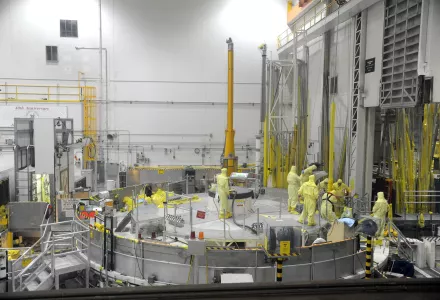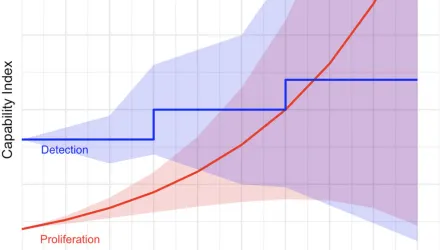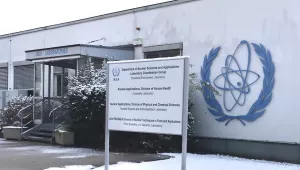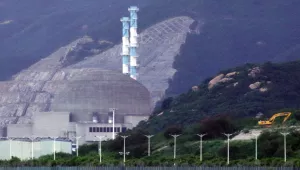
Nuclear operations professionals at Idaho National Laboratory's Advanced Test Reactor routinely refuel the reactor and perform maintenance from the reactor top area.
I. INTRODUCTION
It is my pleasure to introduce and frame this Nuclear Technology special issue, “The Nuclear, Humanities, and Social Science Nexus: Challenges and Opportunities for Speaking Across the Disciplinary Divides.” This special issue features 13 papers authored by humanists and social scientists who, though each rooted in distinct and rich scholarly traditions, share with each other an interest in the nuclear energy sector. These scholars adopt an intellectually diverse set of theoretical and methodological lenses to examine the work of nuclear energy practitioners and policy makers.
The central aim of this special issue is to explore how research findings and insights from the humanities and social sciences can be used to shape and meaningfully inform the work of practitioners and policy makers in the nuclear energy sector and its corresponding areas of research and practice—all of which presently, in many ways, simultaneously face several challenges and opportunities and find themselves at a crossroads.
Nuclear energy’s challenges are frequently (and have long been) described as having a significant “social” dimension. These challenges, as interpreted by nuclear engineers, include failures to site nuclear power plants and used nuclear fuel repositories, or more broadly, to secure support and approval for sustaining or expanding the use of nuclear energy. A negative perception of nuclear energy is frequently cited by nuclear engineers as the source of these challenges. Still other problems are believed to be the result of institutional failures and managerial difficulties. These include delays in construction projects and escalation of plant costs, the slow pace of development and commercialization of new nuclear energy technologies, and failures of regulatory institutions.
In spite of, or perhaps because of, these challenges, organizations in the nuclear energy sector have, since their inception, proved to be rich research sites for scholars in the humanities and social sciences. In a significant and growing base of scholarship, researchers—historians, political scientists, sociologists, anthropologists, and science and technology studies (STS) scholars—have used a diverse, rich, and increasingly sophisticated set of theoretical and methodological approaches to examine the work of practitioners in nuclear organizations.
Some concepts developed by social scientists have proved to be pivotal for the work of practitioners in the nuclear sector. For example, the idea of an organization that is capable of rapid and continuous learning—operationalized by the Institute of Nuclear Power Operations and World Association of Nuclear Operators for the nuclear industry—comes from a long line of sociological and management research on “high-reliability organizations.” Further, the idea that culture can play an important role in ensuring safety also finds its basis in a long tradition of sociological and anthropological research on culture. However, these concepts are often not used as the humanists and social scientists intended or used instrumentally.
They undergo modification in their translation from research to practice, and their uptake and use by practitioners and policy makers in the nuclear sector have largely been serendipitous. Further, while social science scholars have produced a growing and increasingly relevant literature, it has not received significant attention from academic and practitioner nuclear engineers, nor has it really made its way into the intellectual canon of nuclear engineering and its pedagogy. This special issue as a whole, and each of the papers in it, seeks to bridge the intellectual divides between the nuclear sector and the researchers who have long studied its work and practices.
The purpose of this introductory paper is to synthesize the findings across the papers that appear in this special issue, draw connections across them, and point to some potential areas of future collaboration across nuclear engineering, humanities, and the social sciences.
Verma, Aditi. “The Nuclear, Humanities, and Social Science Nexus: Challenges and Opportunities for Speaking Across the Disciplinary Divides.” Nuclear Technology, August 7, 2021
The full text of this publication is available via Nuclear Technology.





